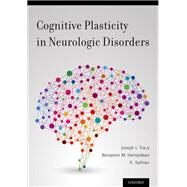Cognitive Plasticity in Neurologic Disorders
, by Tracy, Joseph I; Hampstead, Benjamin M; Sathian, K.- ISBN: 9780199965243 | 0199965242
- Cover: Hardcover
- Copyright: 12/2/2014
Cognitive Plasticity in Neurologic Disorders describes and specifies the cognitive impact of neuroplastic processes in key neurologic disorders and syndromes. It is set apart from previous works in this area by its emphasis on the changing quality of neurocognition, demonstrating that this dynamic nature emerges from the neuroplastic processes at work in both mild and severe states of brain disease or injury. This resource describes the ways neurological illness or trauma (or attempts to treat patients with such conditions) can trigger neuroplastic mechanisms in the brain, inducing cognitive reorganization and remapping of brain networks.
Each chapter shows how the cognitive and behavioral presentation of the disorder mirrors the changing neurobiologic context, and displays the numerous techniques being employed (e.g. behavior and rehabilitation therapies, electrical stimulation, and computer/machine neuromodulation of brain signals) underlying the neurobiology in ways that facilitate adaptive plasticity and cognitive recovery. An important feature of the book involves characterizing the degree to which the mechanistic principles governing neuroplastic responses and cognitive reorganization in the brain have been elucidated, making clear that it is these principles which will allow us to further develop rational rehabilitative therapies, match patients to appropriate treatments, and even begin to predict clinical treatment outcomes.
Each chapter shows how the cognitive and behavioral presentation of the disorder mirrors the changing neurobiologic context, and displays the numerous techniques being employed (e.g. behavior and rehabilitation therapies, electrical stimulation, and computer/machine neuromodulation of brain signals) underlying the neurobiology in ways that facilitate adaptive plasticity and cognitive recovery. An important feature of the book involves characterizing the degree to which the mechanistic principles governing neuroplastic responses and cognitive reorganization in the brain have been elucidated, making clear that it is these principles which will allow us to further develop rational rehabilitative therapies, match patients to appropriate treatments, and even begin to predict clinical treatment outcomes.







